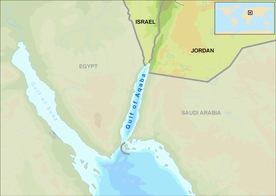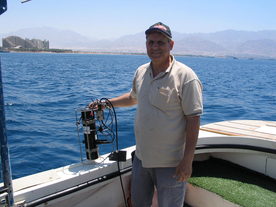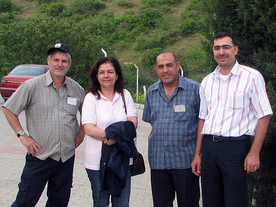Protecting the Gulf of Aqaba
Environmental concerns bring scientists together in NATO-sponsored project
With the support of NATO’s Science for Peace and Security (SPS) Programme, scientists from Jordan, Israel and Turkey are trying to protect the Gulf of Aqaba, one of the top diving destinations in the world. Many environmental problems have no borders, which can be both a challenge and an opportunity.

Cross-border cooperation can be difficult to develop. However, when scientists from different countries are united in common cause, their collaboration can bear fruit which goes beyond science and the environment.
The environmental challenge
 Due in part to its coral reefs and marine biodiversity, tourists flock to cities that border the Gulf to windsurf on the beautiful blue waters and dive among the corals. As a result, Eilat (Israel) and Aqaba (Jordan) have become popular resort destinations that depend on tourism.
Due in part to its coral reefs and marine biodiversity, tourists flock to cities that border the Gulf to windsurf on the beautiful blue waters and dive among the corals. As a result, Eilat (Israel) and Aqaba (Jordan) have become popular resort destinations that depend on tourism.
But environmental factors could threaten this important source of revenue. There is evidence that the water quality has been decreasing in recent years, due to human activity and industrial pollution in the coastal zones surrounding the Gulf. It is possible that global climate change may also be a contributory factor.
Because of the sensitivity of coral to environmental factors, increased dust deposit in the Gulf due to the desertification processes in surrounding countries, warmer ocean temperatures caused by an increase in atmospheric greenhouse gases, and increased UV due to ozone depletion can all play a role in deteriorating reef conditions.
Developing an early warning system
 The idea for the project came about at a conference where Dr Tariq Al-Najjar, an Associate Professor of Marine Biology and Ecology at the University of Jordan’s Marine Science Station, met Dr Dilek Ediger, a Senior Researcher in the Environment Institute of TÜBİTAK Marmara Research Centre in Turkey. Dr Ediger, one of the project co-directors, told her Jordanian counterpart about the possibilities for project sponsorship under the SPS Programme. Dr Al-Najjar later informed an Israeli counterpart, Dr David Iluz, a Lecturer at Bar-Ilan University, about the programme. The three then developed a project proposal to protect the Gulf of Aqaba and were awarded an SPS grant in September 2007 .
The idea for the project came about at a conference where Dr Tariq Al-Najjar, an Associate Professor of Marine Biology and Ecology at the University of Jordan’s Marine Science Station, met Dr Dilek Ediger, a Senior Researcher in the Environment Institute of TÜBİTAK Marmara Research Centre in Turkey. Dr Ediger, one of the project co-directors, told her Jordanian counterpart about the possibilities for project sponsorship under the SPS Programme. Dr Al-Najjar later informed an Israeli counterpart, Dr David Iluz, a Lecturer at Bar-Ilan University, about the programme. The three then developed a project proposal to protect the Gulf of Aqaba and were awarded an SPS grant in September 2007 .
One of the goals of the project, says Dr Al-Najjar, was to “establish cooperation between Israel, Jordan and Turkey in marine sciences.” To this end, seven graduate students, lead by co-directors from all three countries, have been working on a project designed to detect damage to the waters of the Gulf of Aqaba.
 The project team has been going on monthly cruises to collect samples of phytoplankton off the coast of Jordan and Israel. Since phytoplankton is sensitive to both pollution and eutrophication (a process where water bodies receive excess nutrients that stimulate excessive plant growth), these samples will help the scientists to develop a model to monitor the conditions in the Gulf.
The project team has been going on monthly cruises to collect samples of phytoplankton off the coast of Jordan and Israel. Since phytoplankton is sensitive to both pollution and eutrophication (a process where water bodies receive excess nutrients that stimulate excessive plant growth), these samples will help the scientists to develop a model to monitor the conditions in the Gulf.
This same model will give the respective governments and non-governmental organizations an early warning sign of deteriorating conditions in the waters of Aqaba and Eilat. By also using the model to predict conditions in the Gulf, corrective action can be taken to protect it.
Beyond science and the environment
Beyond the scientific and environmental impact of the project, protecting the Gulf will by extension help protect the tourism industry that is so vital to the local economy.
The project also has an educational dimension. In an effort to increase appreciation for the Gulf of Aqaba’s unique marine life and to protect its resources in the future, the project co-directors will also produce videos, CDs, pamphlets and educational material in Hebrew and Arabic for distribution to the more than 150,000 people who live in Aqaba and Eilat.
Dr Iluz, the Israeli co-director of the project, sees other advantages as well. In addition to the students involved in the project learning new scientific methods, he points out that sending students to work in Turkey and in Jordan is “a good way to introduce them to other cultures.” Ultimately, he thinks these interactions have a non-scientific benefit too: “I think working together gives something to the peace in this area.”
“The potential of science to contribute to peace is one of the raisons d’être of NATO’s Science for Peace programme,” says Dr Christiaan De Wispelaere, the SPS Advisor who oversees the project at NATO Headquarters. “The SPS programme aims to contibute to security, stability and solidarity among countries by applying science to problem solving.”
The SPS programme supports collaboration, networking and capacity building among scientists in NATO and partner countries, including those countries that are part of NATO’s Mediterranen Dialogue, such as Israel and Jordan.
